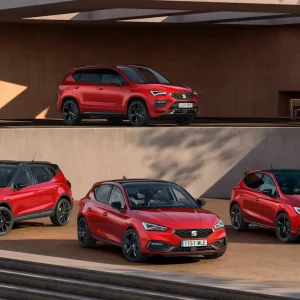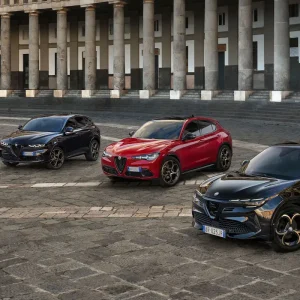New plug-in hybrid versions of the Range Rover Evoque and Land Rover Discovery Sport are available to order now, with prices starting from £45,370 and £43,850 OTR respectively.
Badged P300e, both the new Range Rover Evoque and Land Rover Discovery Sport plug-in hybrids join the recently introduced 48-volt mild-hybrid SUVs.
The new models combine a 200hp 1.5-litre three-cylinder Ingenium petrol engine with a 109hp electric motor integrated into the rear axle and powered by a 15kWh lithium-ion battery located below the rear seats.
Performance figures reveal acceleration of 0-62mph in 6.4 seconds in the Range Rover Evoque, and 6.6 seconds in the Discovery Sport. Both can reach speeds of up to 84mph using electric power alone.
Depending on specification, the Range Rover Evoque P300e has CO2 emissions from 32g/km and has an all-electric range of between 37 and 41 miles.
The Discovery Sport P300e can travel between 34 and 38 miles using electric power and produces CO2 emissions as low as 36g/km.
Like most PHEVs to date, hybrid mode is the default driving mode, and automatically combines power from the electric motor and petrol engine. The operating strategy adapts to driving conditions and the remaining charge in the battery
Entering a destination in the navigation system enables the ‘predictive energy optimisation’ (PEO) function to intelligently integrate route and GPS data to maximise efficiency and comfort for the selected journey.
EV mode enables the vehicle to run solely on the electric motor using the energy stored in the battery. Save mode prioritises the combustion engine as its main power source, maintaining battery state of charge at the chosen level.
The electric rear axle drive (ERAD) uses a battery pack protected by 6mm-thick steel undertray, allowing the car to travel off-road in line with some customers’ more extreme expectations.
The new PHEV models are available with a Mode 2 home charging cable, enabling customers to fully charge the vehicle from a plug socket in 6hrs 42mins, which is perfect for overnight charging. For faster charging, the Mode 3 charging cable enables customers to plug-in to a 7kW AC domestic wall box or AC public charge points: this enables charging from 0-80% in 1hr 24mins. The quickest charge times are achieved using the growing public charging network of DC charge points: at 32KW DC, 0-80% takes 30 minutes.
Customers can stay connected to the Evoque and Discovery Sport PHEV via Land Rover’s intelligent InControl Remote smartphone application. The app allows customers to monitor the vehicle’s charge status, ready the vehicle for the journey ahead or set a charging timer to take advantage of off-peak energy tariffs.
Drivers can automatically pre-condition the battery and cabin temperature before starting a journey: using mains power to do this when the vehicle is plugged in rather than drawing energy from the battery when you start driving maximises range and enhances occupant comfort.
The new 1.5-litre three-cylinder petrol engine is 37kg lighter than the four-cylinder and also also features a belt-integrated starter-generator (BISG) unit. This works alongside the ERAD to deliver regenerative braking, recharging the battery on the overrun, and also enables smoother, quieter and faster stop-start operation than a traditional starter motor.
A new eight-speed automatic transmission has been selected to match the power and torque delivery of the three-cylinder engine and work seamlessly with the ERAD. As well as being 5kg lighter than the nine-speed transmission used in the other models, the new eight-speed delivers enhanced refinement and shift feel, and is an integral part of the hybrid system.
Company car drivers in the UK will find certain Range Rover Evoque P300e derivatives qualify for a new, lower Benefit-in-Kind (BIK) rate of 6% in 2020/21, thanks to its longer EV range, rising to 8% by 2022/23. With CO2 emissions from 36g/km, and a zero-emissions range of up to 38 miles, Discovery Sport PHEVs qualify for a 10% BIK rate in 2020/21, rising to 12% by 2022/23.





